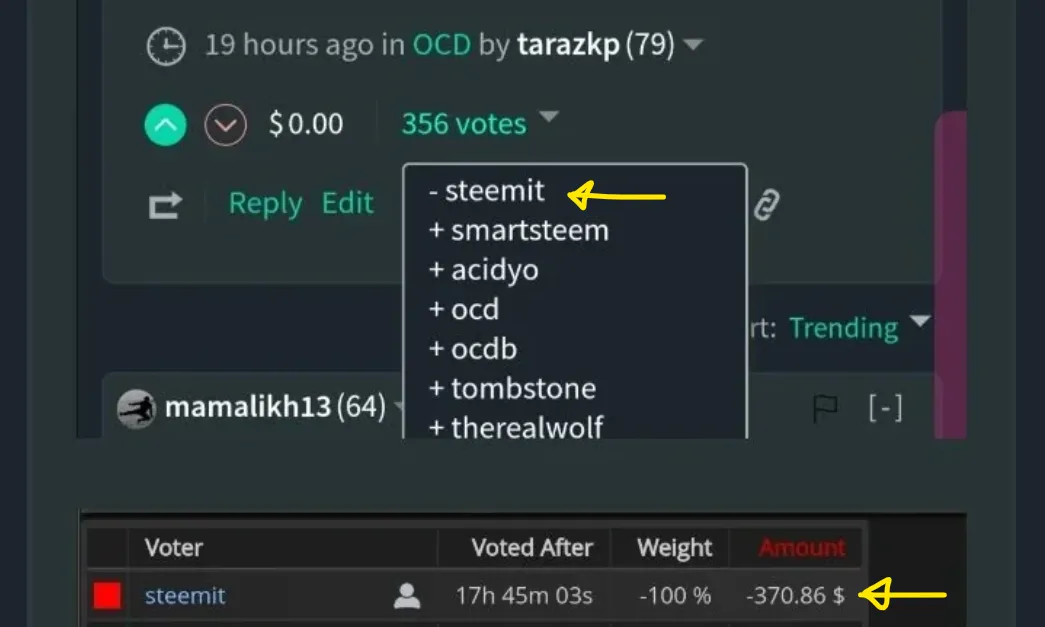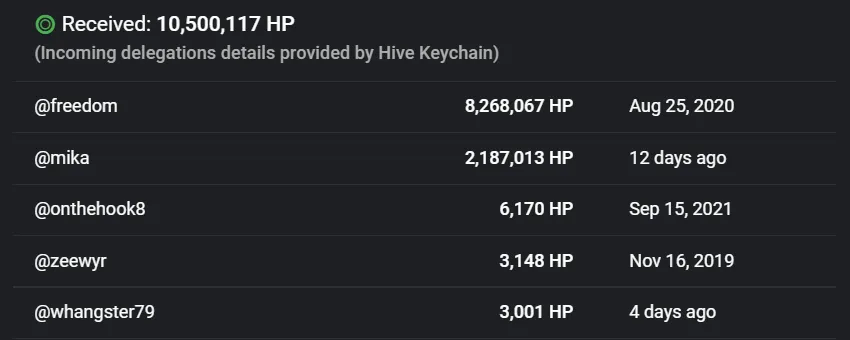The stake giveth and the stake taketh away.
I got my first @appreciator vote ever last night!

It was a downvote
because I also got my first 100% @newsflash vote!

For whatever reason, Appreciator is countering Newsflash, probably because @transisto for many months has been downvoting posts that get votes from larger stake with the "x" accounts. For example, on the same post upvoted by Newsflash, Leo Finance also voted it, so there is this from xleo.voter:

I am no stranger to downvotes and I don't take it personally and, I knew this was going to happen.

I love Hive, because while there is so much opportunity, there is also so much drama because people take it all so seriously. This is largely because there is actual "money" on the table, and when people feel they are deserving of it, they respond poorly when it is "taken away", even if that happens before it is theirs.
Remember, no reward is yours until it is controlled by the keys you control. On a post, this means that no matter what the number may be, it is only yours at payout, seven days after the post was committed to the blockchain. Before that point, it is "in negotiation" with the rest of the stakeholders and for the most part, downvotes are quite rare for most people, even in retaliation or disagreement of rewards.
This doesn't stop people taking a downvote personally though, even if they know that there was nothing personal in the application of it. Sometimes it is personal of course. This is the largest downvote I have got:

Which was because I was supporting the fork from Steem to Hive, which if you don't know much about, you can read it here, which is where I took the screenshot from. It seems like such a long time ago!
Ah... good times.
Of course, while the downvote wiped away any earnings on that post, it was a "little bit" of overkill, as if I remember correctly, there was something like 30 dollars on it. But, it was very personal because I have always been pretty outspoken on various things on both Steem and Hive, including the bidbots like Appreciator was, and the content they vote on. It is also one of the largest staked downvotes ever, as there was something like 45 million Steem behind it :D
Yet, I still strongly agree with this kind of behavior from the various stakeholders, even when the stake is not their own, as is the case with @appreciator. They control 10.5M in stake, but 10.45 million of that is coming from two single accounts - @freedom and @mika. They both hold their keys and delegate as they choose, giving up their right to choose where the power of their stake through votes or downvotes land.

I wonder if any of those delegators have a look at what their value is voting on?
I suspect not.
This is the thing with delegating to curation projects though, without oversight, it is very much blind and that can end up causing problems in many ways, with other stakeholders. Yet, the reason that I defend the practices of downvoting like this is, stakeholders have the power to do as they please with their stake and for example, @transisto does hold his and has done for a long time, using it as he sees fit. How he has used it might be questioned, but it is al within the code of the blockchain, because that is all that can happen.
Hoping that people will do what is "right" is never going to happen however, because firstly, there is very little consensus on what is actually right and secondly, people will often not do what is right, even if they know it, if it is not in their best interest to do so. This is especially true when there is anonymity and pseudonymity.
If you are walking down the street at night with no one around and find a $100 dollar note, do you turn it into the police, or keep it? Is it a case of "finders keepers"?
At least in most countries, there are laws to say that it has to be turned in and if it isn't claimed or they can't find the owner, it is then returned to the person who found it.
Did you do the "right" thing?
Or did you make up your own laws?
Afterall, nothing in the "code" is stopping you from walking away with it, and without witnesses, there is no reason to suspect you will be caught anyway, so then it is more likely to become a crime of opportunity.
Hive has so much opportunity, which is also why there is so much "crime". Downvotes aren't a criminal act by any measure, but for example, stealing someone's keys through a discord scam, is. However, there is little that can be done about it, as even though there can be a tracked paper trail, the masks of the internet prevent anything being able to be done (in most cases) at the practical level. This is even harder in the crypto space.
While a lot of people think that these kinds of behaviors are holding us back, what is actually holding us back is not finding adequate solutions to deal with them. Hoping people will act well is a losing battle, which is why it all has to be applied into the code to incentivize and disincentivize the behaviors we want to see. It is very much like the Ghandi quote,
Be the change you want to see in the world.
Except it is applied at the blockchain level, so that processes encourage better behavior and, that behavior isn't just for a nicer environment, but one where people are able to build a life, which includes earning.
For example, the upcoming Hardfork is going to improve a lot of aspects of the Hive code that will allow Devs to build better experiences on the blockchain, as well as affect the resources required. While it doesn't do much for the reward mechanisms, at the end of the day, the reward values are tied to the development and the user opportunity on those applications, with the hope that the value they bring to their community of users is high enough to encourage continued growth and expanded usage.
Through this expansion of the Hive ecosystem, all of the stakeholders will hopefully increasingly benefit and rather than worrying about all of the drama at the infrastructure level, we will actually start supporting the ecosystem itself, to help it grow. It is a bit of a pipedream however, because unfortunately, there is always going to be tension at the infrastructure level, disagreement that restricts growth, because this is a decentralized environment.
If this was Facebook or Google, things would be far easier and faster to progress, because even if there are millions of stakeholders, very few of them have a say at the operational level. This means that all of the business decisions are centralized, so it is very easy to align. However, on Hive, we as stakeholders are owners of a single business controlled by our keys and people look to maximize their business, even if it conflicts with the growth of everyone's business.
It sounds like all is lost, but this is not actually the case, it is just that it takes far longer to align, but once the pieces fall into place, it becomes a far more robust experience for it. What is going to be a challenge is having the alignment happen fast enough, because the longer we don't align, the more competition will arrive that can learn from our mistakes and build a better experience more efficiently, with less resources and time.
In the case of downvotes however, they are a net positive for the ecosystem, as they are one of the only ways for the community to challenge negative behaviors, at least through the distribution mechanisms, but also through the curbing of unwanted behaviors - even if people don't agree on what those might be completely. But, for those that receive them, it can "feel" like a loss, because we focus on the immediate moment, rather than the long-term view of our experience, which is part of the problem when it comes to stakeholders and why so few see the future value potential.
So, while this is a bit of a long post for this, I think that it is worth it for those who wonder why they might have got some vote and then got an almost equivalent downvote some time later. It is also worth it to understand a bit of why downvotes are important and why it is necessary to develop the code to enable the growth of a healthy ecosystem, rather than relying on the hope that people will do the right thing.
As I see it, ultimately, the value of the Hive blockchain is derived from its ability to support application development on the chain, with a community that is gathered around the many applications, not through the rewarding of content with the core token. However, the rewarding of content is valuable now as a way to build the community and distribute the ownership to those who ware willing to stake-in as owners.
Yet, this is also an imperfect model as experience tells that no matter how much some get, they are the types of people who will powerdown and leave at the first signs of trouble or profit. This will eventually consolidate to holders who support the network, but it takes a lot longer than rewarding those people who are here for the long-haul directly.
Hive is such an interesting experience, isn't it?
Taraz
[ Gen1: Hive ]
